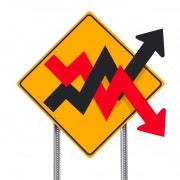A risk-off year
PORTFOLIO POINT: Market patterns were typical for a weakening macro cycle, and makes recession for the developed world a real risk for 2012.
Overall, 2011 was a risk-off year, even if it alternated risk-on/risk-off through the year. Returns varied – with safety beating risk – despite high short-run correlation. The pattern of returns reflected the typical behaviour of markets in a weakening macro cycle. It probably now requires recession for developed market (DM) equities to underperform safe-haven assets in 2012. Recession, however, seems a real and rising risk for most of the developed world, in my view.

In hindsight, 2011 was an almost textbook year for avoiding macro beta. There were some wrinkles, of course, but broadly safe assets did best and risky assets with macro-beta did worse. That was true at the asset class level (Exhibit 1) and within equities. Exhibit 2 shows year-to-date performance for DM equity sectors. Emerging market equities maintained their long-standing correlation with the DM material sector, and consequently underperformed DM equities.

This cycle clearly has special structural features, but the broad brush of what happened this year is “normal” given the deceleration in macro indicators. The underperformance of DM equities versus DM government debt tracked the deceleration in the OECD’s leading economic indicator (Exhibit 3).

Of course the structural backdrop matters a lot. My strategy colleagues, Adam Parker and Graham Secker, argue that deleveraging points to lower trend valuations for equity markets compared to the norm seen through the leveraging phase. However, this structural de-rating may take some time. On a shorter time horizon – say, 2–4 quarters – the macro cycle will be the more important driver of equity performance.
Structural issues will also affect the macro cycle. Western world deleveraging will make for slower growth and, in my view, shorter cycles. Macro cycles tend to be extended through the periods of rising leverage and shorter in deleveraging phases. That’s not a compelling reason to expect a recession next year, but it suggests that recession in 2012 – ending an expansion of only three years, short by the standards of the past 30 years – would not be unusual given deleveraging pressures.
The prospect of medium-term equity de-rating, with shorter macro cycles, implies further trend underperformance of equities versus safe-haven instruments. In short, it’s Japan until further notice. Exhibit 4 shows the performance of Japanese equities relative to Japanese government bonds.
The initial bubble-bursting phase in Japan saw tremendous equity underperformance versus bonds in 1990–93. Equities have continued to underperform on a trend basis, but there have been several clear cycles.

The US has been on a Japan-like path since the equity super-cycle peaked in 2000. As in Japan, much of the initial underperformance was due to equity de-rating. Since then there have been noticeable cycles in the relative performance of equities versus bonds – but, as in Japan, the equity-bond relative has seen lower lows, lower highs (Exhibit 5).

So the structural story continues, and points to a trend derating in equities and the prospect of weaker, shorter macro cycles. But what matters on an intermediate time horizon is the macro cycle. Given the underperformance of DM risk assets this year, I think risk assets could have a mediocre to good
(relative) year if recession is avoided. If there is recession, expect to see significant risk asset losses, particularly in the first half of next year.
Our macro team expects recession in Europe and Graham Secker, our European strategist, remains cautious on European equities. The uncertainty is the US. The recession risk is rising along with the prospect of a material tightening in fiscal policy (which has increased as Congress has not yet agreed to extend the payroll tax cut and extension of unemployment insurance). If US recession eventuates, then expect another poor year for DM equities.
![]() Gerard Minack is head of global developed market strategy at Morgan Stanley.
Gerard Minack is head of global developed market strategy at Morgan Stanley.
















